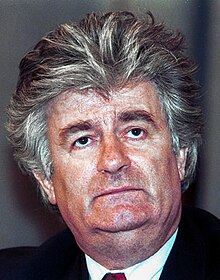Radovan Karadžić
[5][6] He is sometimes referred to by the Western media as the "Butcher of Bosnia",[7][8][9] a sobriquet also applied to former Army of Republika Srpska (VRS) General Ratko Mladić.Radovan Karadžić was born to a Serb family on 19 June 1945 in the village of Petnjica in the People's Republic of Montenegro, Democratic Federal Yugoslavia, near Šavnik.[20] His father had been a Chetnik – i.e. a member of the rightwinged army of the Kingdom of Yugoslavia's government-in-exile during World War II – and was imprisoned by the post-war communist regime for much of his son's childhood.It is widely believed that he never served his then-obligatory 1-year long military service within the Yugoslav People's Army, as such claim was given by Stjepan Kljujić, who was a Croat-member of the Bosnian rotating presidency.According to testimony, he often boosted his income by issuing false medical and psychological evaluations to healthcare workers who wanted early retirement or to criminals who tried to avoid punishment by pleading insanity.The following month, Bosnian Serbs held a referendum which resulted in an overwhelming vote in favour of staying in a federal state with Serbia and Montenegro, as part of Yugoslavia.In December 1991, a top secret document, For the organisation and activity of the Serbian people in Bosnia-Herzegovina in extraordinary circumstances, was drawn up by the SDS leadership.[33] Karadžić was voted President of Republika Srpska, the Bosnian Serb administration, in Pale on about 13 May 1992 after the breakup of the Socialist Federal Republic of Yugoslavia.[35] In 1994, the Greek Orthodox Church declared Karadžić "one of the most prominent sons of our Lord Jesus Christ working for peace", and decorated him with the nine-hundred-year-old Knights' Order of the First Rank of Saint Dionysius of Xanthe.He was accused by the ICTY of ordering the Srebrenica genocide in 1995, directing Bosnian Serb forces to "create an unbearable situation of total insecurity with no hope of further survival of life" in the UN safe area.[47] British officials conceded military action was unlikely to be successful in bringing Karadžić and other suspects to trial, and that putting political pressure on Balkan governments would be more likely to succeed."[49] In 2005, Bosnian Serb leaders called on Karadžić to surrender, stating that Bosnia and Serbia could not move ahead economically or politically while he remained at large.[60] There were reports that Karadžić evaded capture in May 2007 in Vienna, where he lived under the name Petar Glumac, posing as a Croatian seller of herbal solutions and ointments.Judge O-Gon Kwon said that in the absence of Karadžić, who was defending himself, or any lawyer representing him, he was suspending the case for 24 hours, when the prosecution would begin its opening statement.[77] On 26 November 2009, Karadžić filed a motion challenging the legal validity and legitimacy of the tribunal, claiming that "the UN Security Council lacked the power to establish the ICTY, violated agreements under international law in so doing, and delegated non-existent legislative powers to the ICTY",[78] to which the Prosecution response was that "The Appeals Chamber has already determined the validity of the Tribunal’s creation in previous decisions which constitute established precedent on this issue", therefore dismissing the Motion.[80] The discovery of more than 300 previously unknown bodies in a mass grave at the Tomasica mine near Prijedor in September 2013 caused a flurry of motions which ended with the court denying reopening prosecutorial evidence.[88] He was found guilty of genocide for the Srebrenica massacre, which aimed to kill "every able-bodied male" in the town and systematically exterminate the Bosnian Muslim community.He was also convicted of persecution, extermination, deportation and forcible transfer (ethnic cleansing), and murder in connection with his campaign to drive Bosnian Muslims and Croats out of villages claimed by Serb forces.



his trialPresident of Republika SrpskaVice PresidentBiljana PlavšićNikola KoljevićAleksa BuhaPetnjicaMontenegroYugoslaviaBosnia and HerzegovinaSerb Democratic PartyAlma materUniversity of SarajevoColumbia Medical SchoolPsychiatristConviction(s)Genocidecrimes against humanitywar crimesLife imprisonmentZulfikarpašić–Karadžić agreement1991 referendum1992 Independence referendum1993 referendum1994 partition plan referendum1992 anti-war protestsBosnian WarSiege of SarajevoSrebrenica massacreSerbian CyrillicBosnian SerbInternational Criminal Tribunal for the former YugoslaviaBosniakBelgradealternative medicinepsychologyHe was arrestedNetherlandsUnited Nations Detention UnitScheveningensobriquetArmy of Republika SrpskaRatko Mladićgenocide in SrebrenicaHMP ParkhurstIsle of WightPeople's Republic of MontenegroDemocratic Federal YugoslaviaŠavnikPljevljaVuk Stefanović KaradžićChetnikKingdom of Yugoslaviagovernment-in-exileSarajevoSarajevo UniversityStjepan Kljujićneurotic disordersdepressionNæstvedDenmarkColumbia UniversitySerbianDobrica ĆosićVoždovacMomčilo KrajišnikembezzlementFederal Republic of YugoslaviaJovan RaškovićCroatian SerbsSerb Autonomous RegionsBanja LukareferendumYugoslav People's ArmySecond World War genocideBosniaksCroatsMoscowEuropean CommunityUnited StatesSocialist Federal Republic of Yugoslaviade jurearmy of the Bosnian Serb administrationGreek Orthodox ChurchEcumenical Patriarch Bartholomewpoised to attackSerb-held Krajinafallen to the Croatscommand responsibilitySrebrenica genocidesafe areaInternational Tribunal for the Former Yugoslavialaws of warGeneva Conventionstransfer of civiliansUN headquartersservice of processAlien Tort ActUnited States District CourtRichard HolbrookeDayton AgreementBoško Radonjićmilitary actionBalkanKosovodeclared independenceKosovo is Serbia protestnew agesexual problemsdisordersViennaAustrian policeCroatian passportBanatsko Novo SeloCorriere della SeraSerie AVeniceTrial of Radovan KaradžićThe HagueAlphons OrieHolbrookeMadeleine AlbrightMuhamed SacirbeytribunalIain BonomyO-Gon Kwon